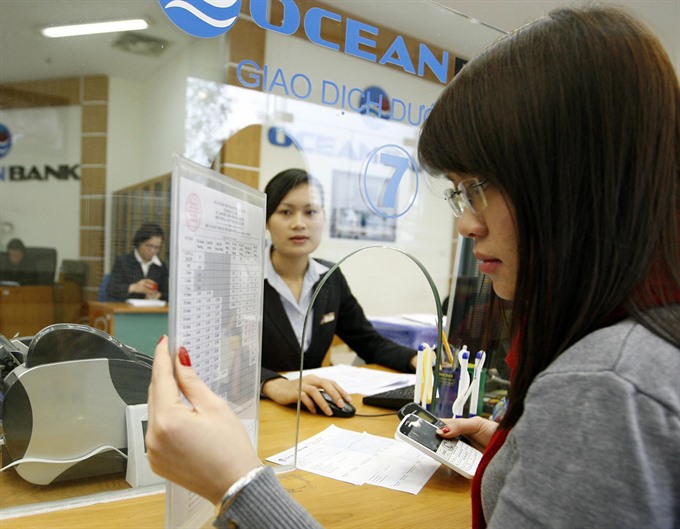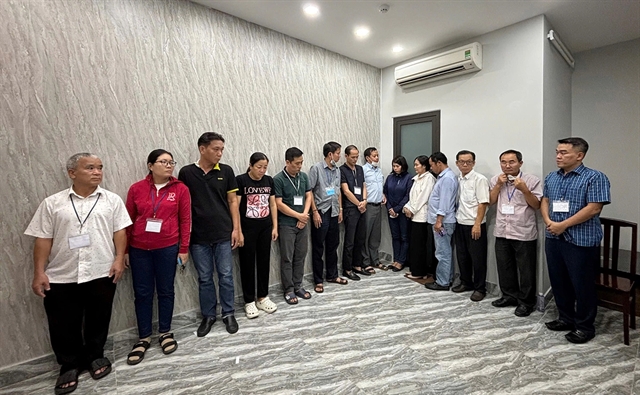 Economy
Economy

The State Bank of Việt Nam (SBV) will stop the acquisition of commercial banks at zero đồng, which it did previously.
 |
| Customers look at an interest rates listing board at the Ocean Commercial One Member Limited Liability Bank. — VNA/VNS Photo Trần Việt |
HÀ NỘI — The State Bank of Việt Nam (SBV) will stop the acquisition of poor-performing commercial banks at zero đồng as it did previously.
The announcement was made at a Government meeting on Tuesday to discuss the draft Law on Credit Institutions Restructuring and Bad Debts Settlement.
The Government also agreed to handle three banks that the SBV bought at zero đồng few years ago by using existing legal regulations.
During the past four years of banking system restructuring, the SBV had to acquire compulsorily three weak banks – Vietnam Construction Bank, Ocean Bank and GP Bank – at zero đồng.
According to the central bank, it must undertake the compulsory transfer measure when weak banks fail to implement recovery measures, dissolution measures (due to the inability to fulfill all debt payment obligations) or bankruptcy measures (due to major impact on the security of the entire society and economy).
Under the draft law, mechanism for weak banks to file for bankruptcy is also mentioned for the first time. The idea of allowing weak banks to go bust is not new but has been included in a legal document for the first time.
Analysts said permitting bankruptcy is essential if restructuring of the banking system needs to be hastened and improved in term of quality.
Banking expert Nguyễn Trí Hiếu noted that permission for firms to file for bankruptcy is necessary, and weak banks are no exception.
Bank bankruptcy is the final solution taken into account when dealing with weak credit institutions, Hiếu said, adding that this would be a long and complicated process but in line with international practice.
"The Law on Bankruptcy includes a chapter on bank bankruptcy but has not yet been applied. Currently, the SBV doesn’t allow weak banks to go bankrupt. However, if the draft becomes law, the situation may change,” Hiếu said.
Echoing Hiếu, lawyer Trương Thanh Đức said the bankruptcy option for weak credit institutions is indispensable. Việt Nam is a market economy, therefore weak banks should be allowed to go bankrupt to make the country’s banking system safe and effective, he said.
According to the central bank, the incomplete legal framework for handling weak banks and bad debts is hindering the restructuring of credit institutions.
The central bank in a note pointed out that it currently does not have adequate jurisdiction to handle weak banks, and there is a shortage of mechanisms and resources for handling bad debts and mortgaged assets, which increase risks to the system and the whole economy.
Statistics revealed that as of the end of 2016, bad debt ratio was controlled at below 3 per cent, but the central bank warned it could amount to 8.86 per cent if bad debts managed by the Việt Nam Asset Management Company and loans that could potentially turn into non-performing were included.
The safety of the credit institution system in Việt Nam remains low compared with other countries in the region, while the burden of supplying capital for the economy is becoming increasingly heavier, making the system vulnerable to shocks, the central bank said.
At the Government’s meeting on Tuesday, Prime Minister Nguyễn Xuân Phúc instructed that streamlining legal regulations and making a specific law on restructuring of credit institutions and settling bad debts are very necessary and must be done urgently.
Phúc said that delaying this would negatively affect the State’s socio-economic management.
The Prime Minister agreed with the proposal of relevant ministries and agencies to submit two legal documents related to the issues: a National Assembly (NA) resolution draft on bad debt settlement, and a draft law on revising Law on Credit Institutions and other relevant laws. The two documents must be submitted to the NA at the same time, he said. — VNS




